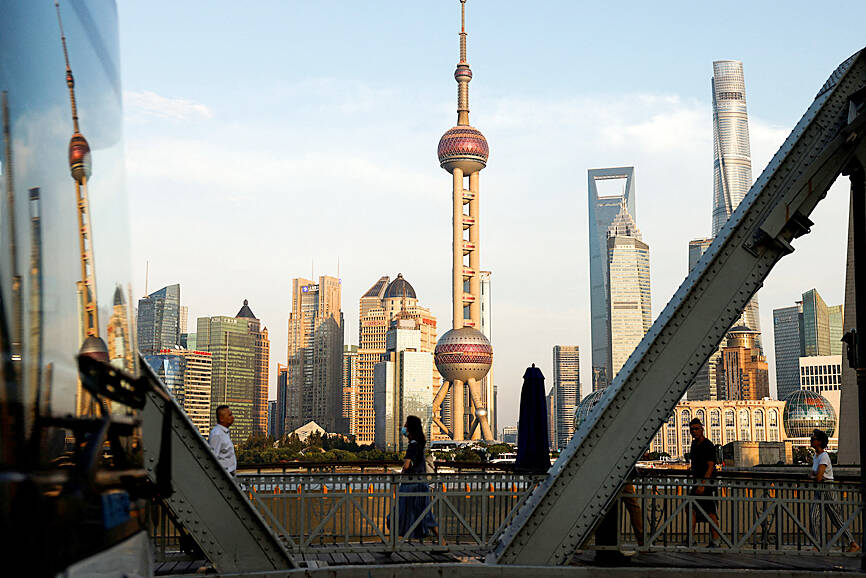Chinese policymakers plan to sell a record 3 trillion yuan (US$411.1 billion) of special treasury bonds next year, as the government seeks to boost the slowing economy, Reuters reported yesterday.
Funds raised from the bonds would be used to support consumption subsidies, business equipment upgrades, and investments in key technology and advanced manufacturing sectors, according to Reuters, which cited two unnamed sources.
Some of the proceeds would also be used to inject capital into large state banks, it said.

Photo: Reuters
Greater fiscal stimulus would help the world’s second-largest economy buffer against expected headwinds from the administration of US president-elect Donald Trump, which has threatened to impose steep tariffs on Chinese imports.
China’s CSI 300 equity benchmark gained about 1 percent after the report, before paring gains. Chinese government bonds extended losses, with the 10-year yield rising four basis points to 1.72 percent from a record-low close in the previous session.
China’s special sovereign bonds are issued for specific purposes — such as financing COVID-19 pandemic-related spending — and therefore are not counted toward the headline budget deficit. The size of the potential bond sales would exceed the 1 trillion yuan sold this year and become the highest on record.
“It’s bigger than our expectations and shows the government’s willingness to shore up growth through a more sizable fiscal stimulus,” Societe Generale SA China economist Michelle Lam (林雪潔) said.
About 1.3 trillion yuan of the funds to be raised would be used to support a consumer product and business equipment trade-in program, as well as major construction projects, Reuters said.
Apart from that, more than 1 trillion yuan would be used to invest in “new productive forces,” which stand for advanced manufacturing sectors such as electric vehicles, Reuters reported.
The rest of the funds would be used to recapitalize large state banks as their profit margins are narrowing, it said.
China would “expand the magnitude of fiscal spending and accelerate the spending pace,” the Chinese Ministry of Finance said yesterday in a statement following a two-day national conference on fiscal work next year.

Sweeping policy changes under US Secretary of Health and Human Services Robert F. Kennedy Jr are having a chilling effect on vaccine makers as anti-vaccine rhetoric has turned into concrete changes in inoculation schedules and recommendations, investors and executives said. The administration of US President Donald Trump has in the past year upended vaccine recommendations, with the country last month ending its longstanding guidance that all children receive inoculations against flu, hepatitis A and other diseases. The unprecedented changes have led to diminished vaccine usage, hurt the investment case for some biotechs, and created a drag that would likely dent revenues and

Macronix International Co (旺宏), the world’s biggest NOR flash memory supplier, yesterday said it would spend NT$22 billion (US$699.1 million) on capacity expansion this year to increase its production of mid-to-low-density memory chips as the world’s major memorychip suppliers are phasing out the market. The company said its planned capital expenditures are about 11 times higher than the NT$1.8 billion it spent on new facilities and equipment last year. A majority of this year’s outlay would be allocated to step up capacity of multi-level cell (MLC) NAND flash memory chips, which are used in embedded multimedia cards (eMMC), a managed

CULPRITS: Factors that affected the slip included falling global crude oil prices, wait-and-see consumer attitudes due to US tariffs and a different Lunar New Year holiday schedule Taiwan’s retail sales ended a nine-year growth streak last year, slipping 0.2 percent from a year earlier as uncertainty over US tariff policies affected demand for durable goods, data released on Friday by the Ministry of Economic Affairs showed. Last year’s retail sales totaled NT$4.84 trillion (US$153.27 billion), down about NT$9.5 billion, or 0.2 percent, from 2024. Despite the decline, the figure was still the second-highest annual sales total on record. Ministry statistics department deputy head Chen Yu-fang (陳玉芳) said sales of cars, motorcycles and related products, which accounted for 17.4 percent of total retail rales last year, fell NT$68.1 billion, or

In the wake of strong global demand for AI applications, Taiwan’s export-oriented economy accelerated with the composite index of economic indicators flashing the first “red” light in December for one year, indicating the economy is in booming mode, the National Development Council (NDC) said yesterday. Moreover, the index of leading indicators, which gauges the potential state of the economy over the next six months, also moved higher in December amid growing optimism over the outlook, the NDC said. In December, the index of economic indicators rose one point from a month earlier to 38, at the lower end of the “red” light.